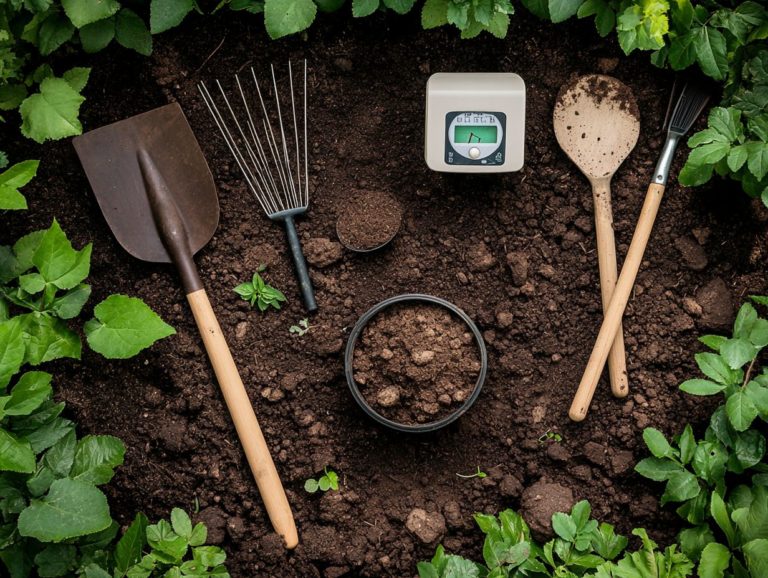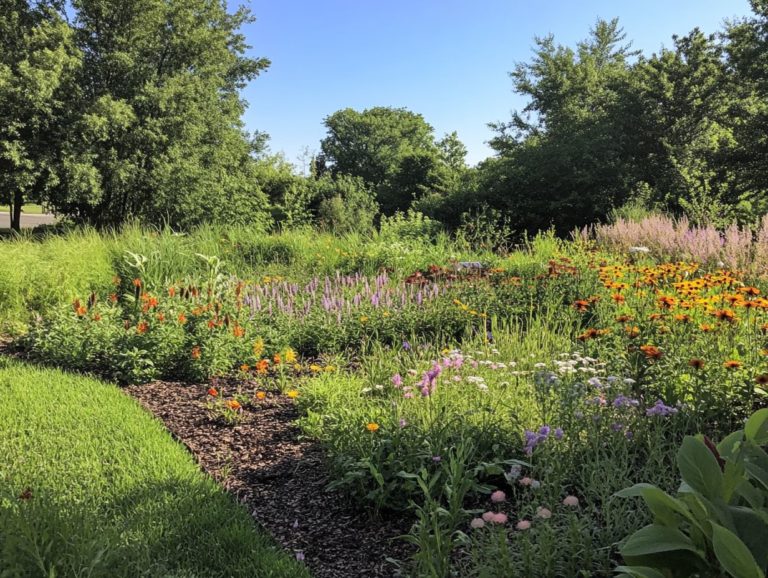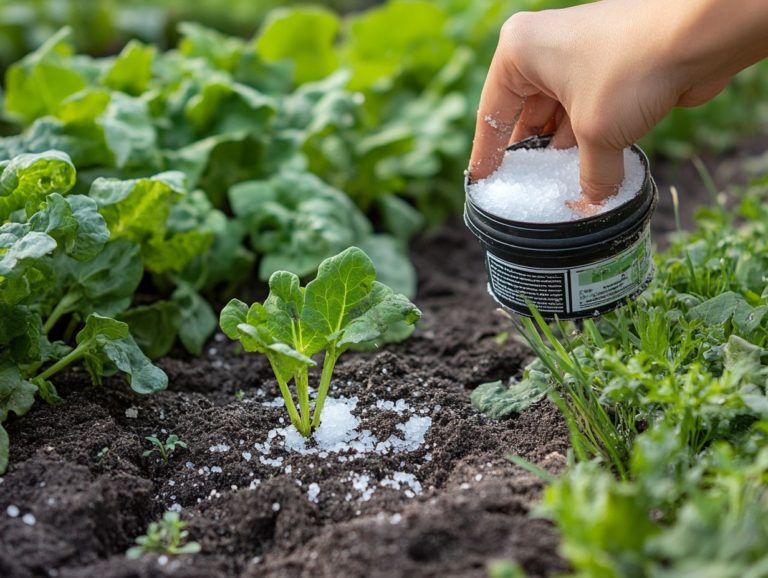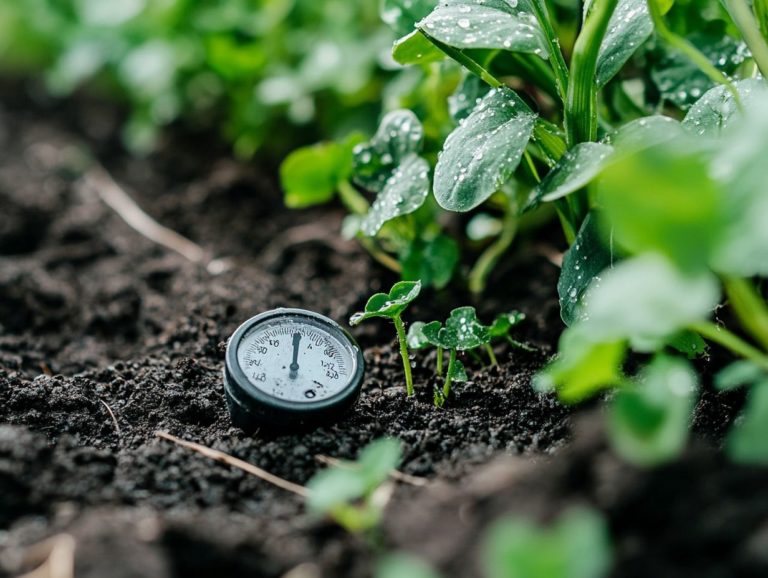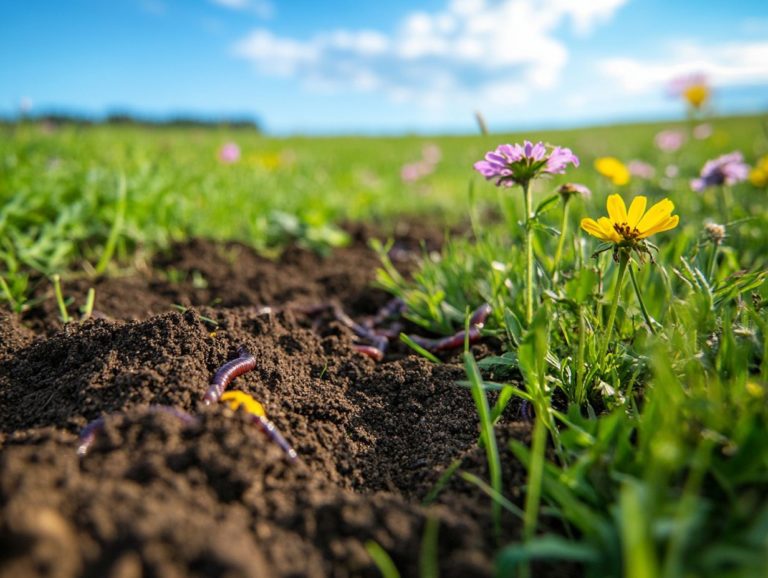How to Use Biochar for Soil Improvement
Discover the amazing benefits of biochar for your garden! Biochar is a remarkable solution for enhancing soil health and promoting vigorous plant growth.
In this article, you ll discover what biochar is, the multitude of benefits it offers, and the various types available for both gardeners and farmers.
You ll learn how to apply biochar effectively to your soil, along with best practices to maximize its advantages while steering clear of common pitfalls. We ll also tackle potential challenges you may face and provide insights on how to overcome them.
Dive in to uncover how biochar can revolutionize your gardening experience!
Contents
Key Takeaways:
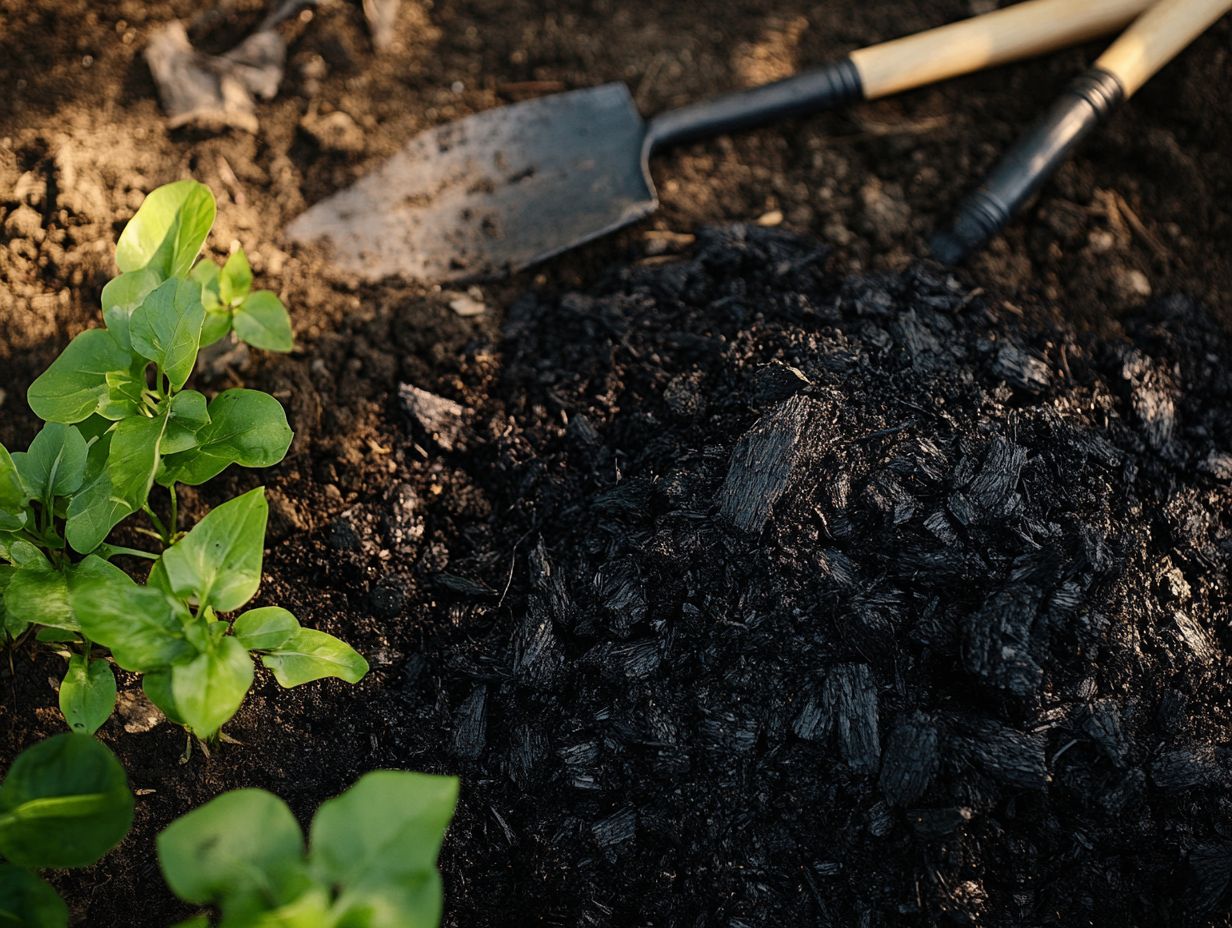
- Biochar is a natural, carbon-rich soil amendment that can improve plant growth and soil health.
- When choosing biochar, consider its source and characteristics to ensure optimal benefits for your specific soil and plants.
- To apply biochar, follow a step-by-step process and think about best practices to avoid challenges and maximize benefits.
What is Biochar and How Does it Work?
Biochar is a remarkable, stable carbon-rich product created through the process of heating organic materials without oxygen, such as agricultural waste. It can significantly enhance your soil properties while supporting sustainable gardening practices.
By incorporating biochar into your gardening and agricultural endeavors, you can improve soil fertility, retain essential nutrients, and promote robust plant growth key elements for maintaining a thriving garden.
The heating process involves organic materials like crop residues, manure, or wood chips, transforming them into biochar while releasing volatile gases. Different feedstocks produce various types of biochar, each offering unique advantages for soil structure and microbial life.
When you add this stable form of carbon to your garden, it not only aids in nutrient retention but also improves aeration and drainage, fostering a richer environment for root development.
As a result, using biochar can lead to stronger, healthier plants that are more resilient to stress. This makes biochar an invaluable tool for both novice and experienced gardeners eager to promote sustainable practices and enhance crop productivity.
Benefits of Using Biochar for Soil Improvement
Utilizing biochar as a soil amendment presents a wealth of advantages, including enhanced soil fertility, improved nutrient retention, and bolstered soil health all essential for robust plant growth.
As a sustainable product, biochar enriches the soil and plays a crucial role in storing carbon to reduce greenhouse gases, helping to combat the effects of climate change.
By applying biochar, you can cultivate enduring soil structures that support thriving ecosystems and foster healthier gardens.
Enhanced Plant Growth and Soil Health
Integrating biochar into your garden soil can significantly boost plant growth and enhance overall soil health. It works wonders by improving nutrient retention and fostering a vibrant community of beneficial microbes.
When biochar interacts with compost and compost tea, it enriches the soil ecosystem, creating an environment that supports robust plant development and resilience against pests and diseases.
This organic amendment, abundant in carbon, acts like a sponge, effectively holding onto essential nutrients such as nitrogen and phosphorus, which are vital for vigorous plant growth. When you combine biochar with compost, you amplify the nutrient content and extend the release of these nutrients over time.
Its porous structure provides ideal habitats for microbes, promoting their activity and diversity. These beneficial organisms break down organic matter more efficiently, leading to improved soil structure and enhanced water retention.
For example, gardens that incorporate biochar alongside traditional fertilizers often report higher yields and improved plant health, showcasing the remarkable synergistic effects of this exceptional soil enhancer.
Try biochar in your garden today for a thriving ecosystem!
Types of Biochar and How to Choose the Right One
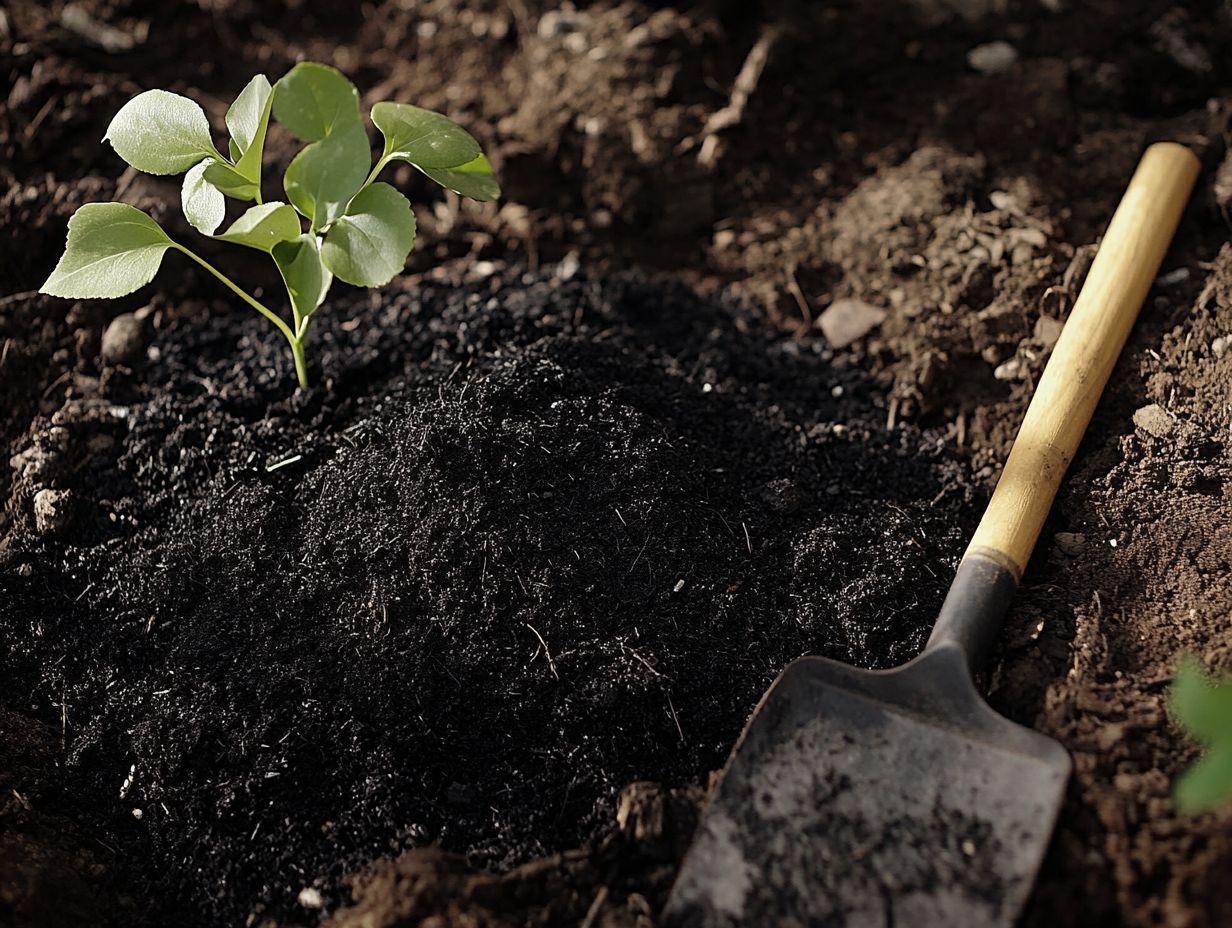
Selecting the right type of biochar is essential for unlocking its full potential in your gardening and agricultural endeavors. Each formulation whether it s raw biochar, activated biochar, or enriched biochar has distinct properties tailored to meet specific soil requirements.
Understanding the carbon content and the intended application is vital for effective use, enabling you to enhance soil structure and boost overall fertility to achieve the best possible results.
Understanding Different Forms of Biochar
Each form of biochar possesses unique characteristics that affect its effectiveness as a soil amendment. This includes its nutrient profile and how it interacts with both soil and plant systems. The three main types are:
- Raw biochar: Created through a heating process that turns organic material into a stable form rich in carbon. This enhances soil aeration and moisture retention.
- Activated biochar: Treated with heat or chemicals, it improves nutrient absorption by increasing porosity.
- Enriched biochar: Modified to include specific nutrients tailored to support particular plants or soil types.
Recognizing when to use each type considering factors like pH levels, moisture retention, and nutrient requirements can profoundly enhance the vitality of your garden and the health of your soil.
How to Apply Biochar to Soil
Applying biochar to your soil is straightforward and can significantly elevate soil health and promote robust plant growth when done properly.
Start by assessing the current condition of your garden soil to determine the ideal application rate. To maximize its benefits, blend biochar with compost; this combination enhances its ability to retain nutrients and fosters increased microbial activity.
Step-by-Step Application Process
Follow these key actions to ensure effective integration of biochar into your garden soil:
- Clear your garden area of any debris and weeds to create a clean base for application.
- Once the soil is adequately loosened and aerated, mix in biochar along with compost to enrich the nutrient profile.
- After achieving a uniform blend, incorporate this mixture into the top layers of soil for optimal nutrient exchange.
Regular follow-up actions, such as watering and monitoring soil moisture levels, are vital to ensure that the biochar performs effectively, gradually enhancing your soil health over time. This process fortifies nutrient retention and reduces overall greenhouse gas emissions, showcasing the multifaceted benefits of biochar in sustainable gardening.
Best Practices for Using Biochar
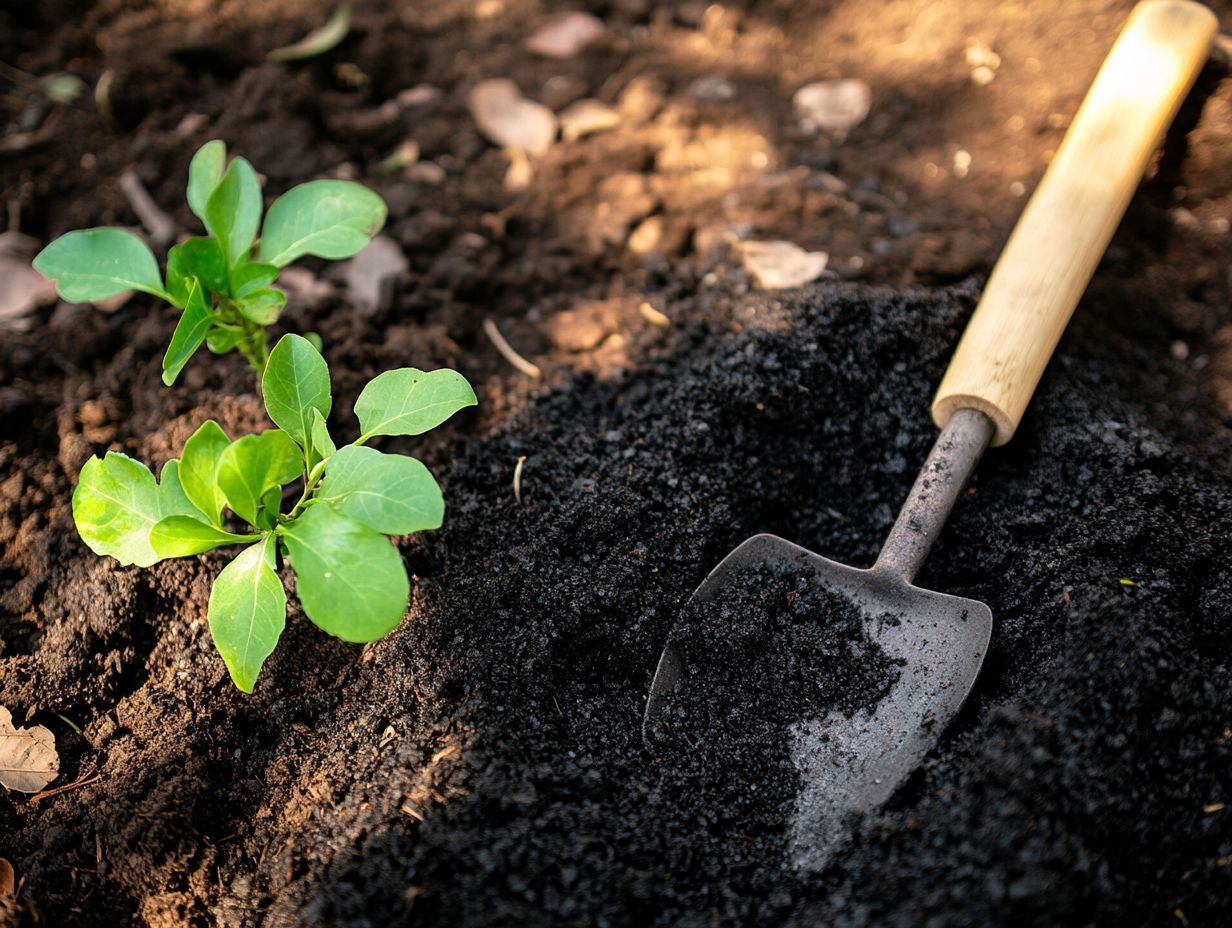
Follow best practices to maximize biochar’s benefits. Mixing it with compost and applying the right amount can supercharge your garden’s growth!
By incorporating biochar with compost, applying it at the correct rate, and considering specific soil types, you can significantly enhance water retention and boost nutrient availability, paving the way for a flourishing garden.
Tips for Maximizing Benefits and Avoiding Pitfalls
To harness the benefits of biochar, you must grasp its application techniques. Understanding how it interacts with compost and other soil amendments is crucial.
Effective strategies can enhance plant growth, improve water retention, and help cultivate a thriving garden.
Timing is essential when using biochar. Applying it in the fall allows it to integrate seamlessly into the soil over winter, setting the stage for robust spring growth.
Mixing biochar with compost not only boosts nutrient absorption but also increases microbial activity. This fosters a more fertile ecosystem.
It s vital to tailor your application based on soil type. Sandy soils may benefit from a higher biochar ratio to enhance moisture retention. In contrast, clay soils could thrive with a lighter mix to improve aeration.
These strategies ensure a harmonious interaction between biochar and other amendments, paving the way for a truly productive gardening experience.
Potential Challenges and Solutions
Biochar presents numerous benefits for enhancing soil health and promoting plant growth. However, it’s important to remain aware of potential challenges.
Addressing issues such as incorrect application rates, imbalances in soil pH, and concerns about carbon emissions can significantly enhance biochar s effectiveness in your gardening endeavors.
Thoughtful solutions to these challenges will enable you to fully harness the advantages that biochar offers.
Common Issues and How to Address Them
Common issues related to biochar application include improper soil pH levels, inadequate nutrient availability, and miscalculation of application rates. These can undermine its potential to improve soil health.
Identifying these challenges early and implementing targeted solutions ensures that biochar positively contributes to soil fertility and plant growth.
One frequent concern is that biochar can alter soil pH, creating conditions unsuitable for some plants. Testing soil pH before application and selecting biochar tailored to specific plant needs can make a significant difference.
Biochar often has limited nutrient content, which can hinder its effectiveness. Mixing it with compost or other organic matter can boost nutrient availability.
Understanding application rates is essential. Using guidelines specific to your soil type and plant needs will help you avoid the pitfalls of over- or under-application. This maximizes the benefits of this innovative amendment.
Frequently Asked Questions
Got questions about biochar? You re not alone! Here are some common queries answered.
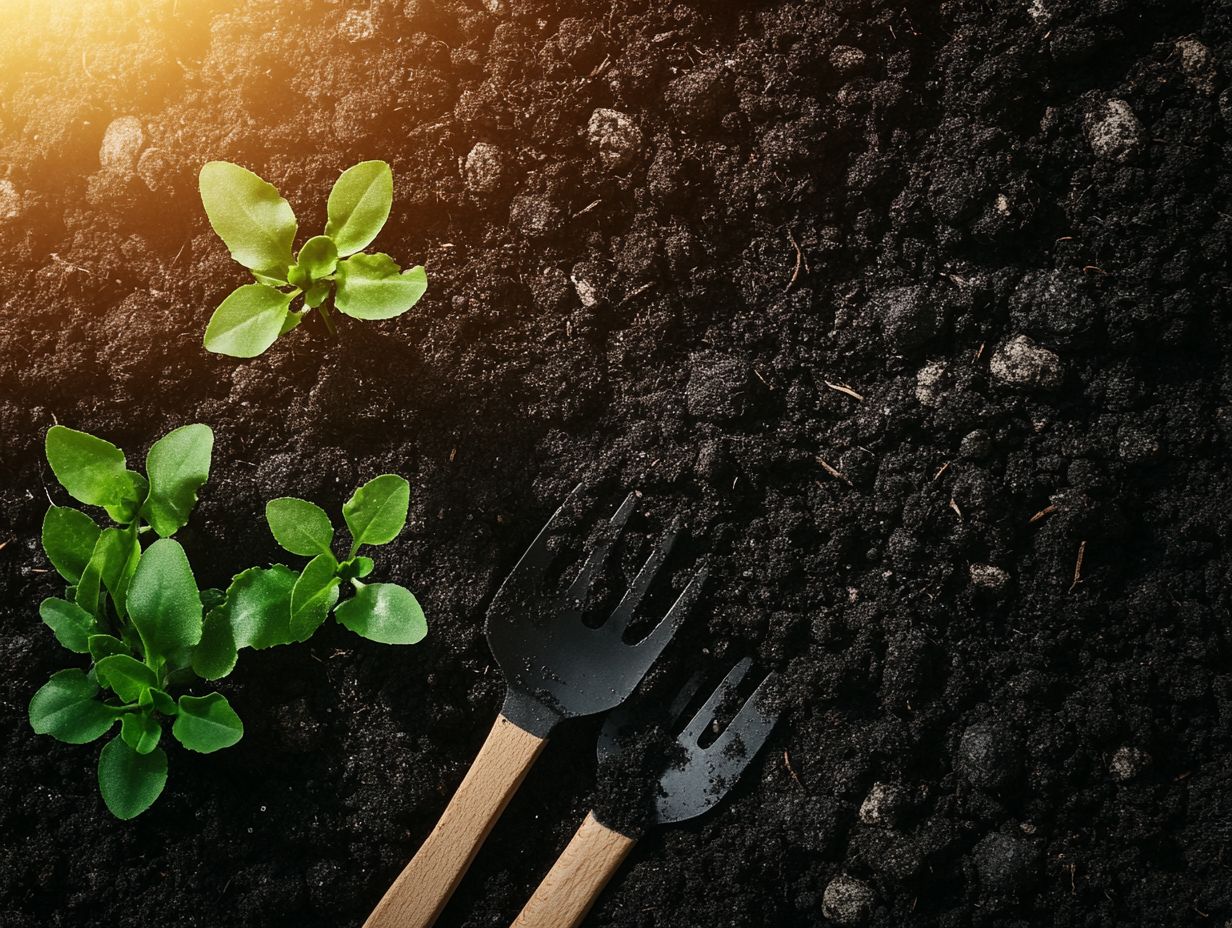
What is biochar and how does it improve soil?
Biochar is a porous form of charcoal created by burning organic materials in a low-oxygen environment. It enhances soil by increasing water and nutrient retention, promoting microbial activity, and reducing soil acidity.
How do I apply biochar to my soil?
You can apply biochar in a few ways: mix it into the top few inches of soil, sprinkle it on the surface and water it in, or add it to compost and spread the compost on your soil.
How much biochar should I use for my soil?
The recommended amount is 5-10% of your total soil volume. For every 100 square feet of soil, use 5-10 cubic feet of biochar.
Can I make biochar at home?
Yes, you can make biochar at home by burning organic materials such as wood chips or crop residues in a barrel or pit with limited oxygen. Follow safety precautions and ensure the biochar is fully cooled before handling.
How often should I apply biochar to my soil?
It’s recommended to apply biochar once every 3-5 years. This allows enough time for it to fully integrate into the soil and provide long-term benefits.
Can I use biochar in all types of soil?
Yes, biochar can be used in all soil types, including sandy, clay, and loamy soils. It can enhance soil structure and fertility in all types, though the amount used may vary based on the specific soil type.

